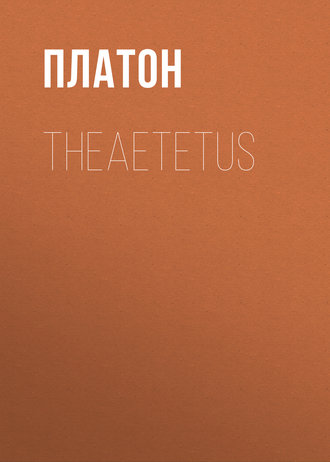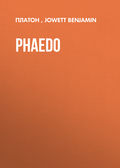
Платон
Theaetetus
Socrates begins by asking Theodorus whether, in his visit to Athens, he has found any Athenian youth likely to attain distinction in science. 'Yes, Socrates, there is one very remarkable youth, with whom I have become acquainted. He is no beauty, and therefore you need not imagine that I am in love with him; and, to say the truth, he is very like you, for he has a snub nose, and projecting eyes, although these features are not so marked in him as in you. He combines the most various qualities, quickness, patience, courage; and he is gentle as well as wise, always silently flowing on, like a river of oil. Look! he is the middle one of those who are entering the palaestra.'
Socrates, who does not know his name, recognizes him as the son of Euphronius, who was himself a good man and a rich. He is informed by Theodorus that the youth is named Theaetetus, but the property of his father has disappeared in the hands of trustees; this does not, however, prevent him from adding liberality to his other virtues. At the desire of Socrates he invites Theaetetus to sit by them.
'Yes,' says Socrates, 'that I may see in you, Theaetetus, the image of my ugly self, as Theodorus declares. Not that his remark is of any importance; for though he is a philosopher, he is not a painter, and therefore he is no judge of our faces; but, as he is a man of science, he may be a judge of our intellects. And if he were to praise the mental endowments of either of us, in that case the hearer of the eulogy ought to examine into what he says, and the subject should not refuse to be examined.' Theaetetus consents, and is caught in a trap (compare the similar trap which is laid for Theodorus). 'Then, Theaetetus, you will have to be examined, for Theodorus has been praising you in a style of which I never heard the like.' 'He was only jesting.' 'Nay, that is not his way; and I cannot allow you, on that pretence, to retract the assent which you have already given, or I shall make Theodorus repeat your praises, and swear to them.' Theaetetus, in reply, professes that he is willing to be examined, and Socrates begins by asking him what he learns of Theodorus. He is himself anxious to learn anything of anybody; and now he has a little question to which he wants Theaetetus or Theodorus (or whichever of the company would not be 'donkey' to the rest) to find an answer. Without further preface, but at the same time apologizing for his eagerness, he asks, 'What is knowledge?' Theodorus is too old to answer questions, and begs him to interrogate Theaetetus, who has the advantage of youth.
Theaetetus replies, that knowledge is what he learns of Theodorus, i.e. geometry and arithmetic; and that there are other kinds of knowledge – shoemaking, carpentering, and the like. But Socrates rejoins, that this answer contains too much and also too little. For although Theaetetus has enumerated several kinds of knowledge, he has not explained the common nature of them; as if he had been asked, 'What is clay?' and instead of saying 'Clay is moistened earth,' he had answered, 'There is one clay of image-makers, another of potters, another of oven-makers.' Theaetetus at once divines that Socrates means him to extend to all kinds of knowledge the same process of generalization which he has already learned to apply to arithmetic. For he has discovered a division of numbers into square numbers, 4, 9, 16, etc., which are composed of equal factors, and represent figures which have equal sides, and oblong numbers, 3, 5, 6, 7, etc., which are composed of unequal factors, and represent figures which have unequal sides. But he has never succeeded in attaining a similar conception of knowledge, though he has often tried; and, when this and similar questions were brought to him from Socrates, has been sorely distressed by them. Socrates explains to him that he is in labour. For men as well as women have pangs of labour; and both at times require the assistance of midwives. And he, Socrates, is a midwife, although this is a secret; he has inherited the art from his mother bold and bluff, and he ushers into light, not children, but the thoughts of men. Like the midwives, who are 'past bearing children,' he too can have no offspring – the God will not allow him to bring anything into the world of his own. He also reminds Theaetetus that the midwives are or ought to be the only matchmakers (this is the preparation for a biting jest); for those who reap the fruit are most likely to know on what soil the plants will grow. But respectable midwives avoid this department of practice – they do not want to be called procuresses. There are some other differences between the two sorts of pregnancy. For women do not bring into the world at one time real children and at another time idols which are with difficulty distinguished from them. 'At first,' says Socrates in his character of the man-midwife, 'my patients are barren and stolid, but after a while they "round apace," if the gods are propitious to them; and this is due not to me but to themselves; I and the god only assist in bringing their ideas to the birth. Many of them have left me too soon, and the result has been that they have produced abortions; or when I have delivered them of children they have lost them by an ill bringing up, and have ended by seeing themselves, as others see them, to be great fools. Aristides, the son of Lysimachus, is one of these, and there have been others. The truants often return to me and beg to be taken back; and then, if my familiar allows me, which is not always the case, I receive them, and they begin to grow again. There come to me also those who have nothing in them, and have no need of my art; and I am their matchmaker (see above), and marry them to Prodicus or some other inspired sage who is likely to suit them. I tell you this long story because I suspect that you are in labour. Come then to me, who am a midwife, and the son of a midwife, and I will deliver you. And do not bite me, as the women do, if I abstract your first-born; for I am acting out of good-will towards you; the God who is within me is the friend of man, though he will not allow me to dissemble the truth. Once more then, Theaetetus, I repeat my old question – "What is knowledge?" Take courage, and by the help of God you will discover an answer.' 'My answer is, that knowledge is perception.' 'That is the theory of Protagoras, who has another way of expressing the same thing when he says, "Man is the measure of all things." He was a very wise man, and we should try to understand him. In order to illustrate his meaning let me suppose that there is the same wind blowing in our faces, and one of us may be hot and the other cold. How is this? Protagoras will reply that the wind is hot to him who is cold, cold to him who is hot. And "is" means "appears," and when you say "appears to him," that means "he feels." Thus feeling, appearance, perception, coincide with being. I suspect, however, that this was only a "facon de parler," by which he imposed on the common herd like you and me; he told "the truth" (in allusion to the title of his book, which was called "The Truth") in secret to his disciples. For he was really a votary of that famous philosophy in which all things are said to be relative; nothing is great or small, or heavy or light, or one, but all is in motion and mixture and transition and flux and generation, not "being," as we ignorantly affirm, but "becoming." This has been the doctrine, not of Protagoras only, but of all philosophers, with the single exception of Parmenides; Empedocles, Heracleitus, and others, and all the poets, with Epicharmus, the king of Comedy, and Homer, the king of Tragedy, at their head, have said the same; the latter has these words —
"Ocean, whence the gods sprang, and mother Tethys."
And many arguments are used to show, that motion is the source of life, and rest of death: fire and warmth are produced by friction, and living creatures owe their origin to a similar cause; the bodily frame is preserved by exercise and destroyed by indolence; and if the sun ceased to move, "chaos would come again." Now apply this doctrine of "All is motion" to the senses, and first of all to the sense of sight. The colour of white, or any other colour, is neither in the eyes nor out of them, but ever in motion between the object and the eye, and varying in the case of every percipient. All is relative, and, as the followers of Protagoras remark, endless contradictions arise when we deny this; e.g. here are six dice; they are more than four and less than twelve; "more and also less," would you not say?' 'Yes.' 'But Protagoras will retort: "Can anything be more or less without addition or subtraction?"'
'I should say "No" if I were not afraid of contradicting my former answer.'
'And if you say "Yes," the tongue will escape conviction but not the mind, as Euripides would say?' 'True.' 'The thoroughbred Sophists, who know all that can be known, would have a sparring match over this, but you and I, who have no professional pride, want only to discover whether our ideas are clear and consistent. And we cannot be wrong in saying, first, that nothing can be greater or less while remaining equal; secondly, that there can be no becoming greater or less without addition or subtraction; thirdly, that what is and was not, cannot be without having become. But then how is this reconcilable with the case of the dice, and with similar examples? – that is the question.' 'I am often perplexed and amazed, Socrates, by these difficulties.' 'That is because you are a philosopher, for philosophy begins in wonder, and Iris is the child of Thaumas. Do you know the original principle on which the doctrine of Protagoras is based?' 'No.' 'Then I will tell you; but we must not let the uninitiated hear, and by the uninitiated I mean the obstinate people who believe in nothing which they cannot hold in their hands. The brethren whose mysteries I am about to unfold to you are far more ingenious. They maintain that all is motion; and that motion has two forms, action and passion, out of which endless phenomena are created, also in two forms – sense and the object of sense – which come to the birth together. There are two kinds of motions, a slow and a fast; the motions of the agent and the patient are slower, because they move and create in and about themselves, but the things which are born of them have a swifter motion, and pass rapidly from place to place. The eye and the appropriate object come together, and give birth to whiteness and the sensation of whiteness; the eye is filled with seeing, and becomes not sight but a seeing eye, and the object is filled with whiteness, and becomes not whiteness but white; and no other compound of either with another would have produced the same effect. All sensation is to be resolved into a similar combination of an agent and patient. Of either, taken separately, no idea can be formed; and the agent may become a patient, and the patient an agent. Hence there arises a general reflection that nothing is, but all things become; no name can detain or fix them. Are not these speculations charming, Theaetetus, and very good for a person in your interesting situation? I am offering you specimens of other men's wisdom, because I have no wisdom of my own, and I want to deliver you of something; and presently we will see whether you have brought forth wind or not. Tell me, then, what do you think of the notion that "All things are becoming"?'
'When I hear your arguments, I am marvellously ready to assent.'
'But I ought not to conceal from you that there is a serious objection which may be urged against this doctrine of Protagoras. For there are states, such as madness and dreaming, in which perception is false; and half our life is spent in dreaming; and who can say that at this instant we are not dreaming? Even the fancies of madmen are real at the time. But if knowledge is perception, how can we distinguish between the true and the false in such cases? Having stated the objection, I will now state the answer. Protagoras would deny the continuity of phenomena; he would say that what is different is entirely different, and whether active or passive has a different power. There are infinite agents and patients in the world, and these produce in every combination of them a different perception. Take myself as an instance: – Socrates may be ill or he may be well, – and remember that Socrates, with all his accidents, is spoken of. The wine which I drink when I am well is pleasant to me, but the same wine is unpleasant to me when I am ill. And there is nothing else from which I can receive the same impression, nor can another receive the same impression from the wine. Neither can I and the object of sense become separately what we become together. For the one in becoming is relative to the other, but they have no other relation; and the combination of them is absolute at each moment. (In modern language, the act of sensation is really indivisible, though capable of a mental analysis into subject and object.) My sensation alone is true, and true to me only. And therefore, as Protagoras says, "To myself I am the judge of what is and what is not." Thus the flux of Homer and Heracleitus, the great Protagorean saying that "Man is the measure of all things," the doctrine of Theaetetus that "Knowledge is perception," have all the same meaning. And this is thy new-born child, which by my art I have brought to light; and you must not be angry if instead of rearing your infant we expose him.'
'Theaetetus will not be angry,' says Theodorus; 'he is very good-natured. But I should like to know, Socrates, whether you mean to say that all this is untrue?'
'First reminding you that I am not the bag which contains the arguments, but that I extract them from Theaetetus, shall I tell you what amazes me in your friend Protagoras?'
'What may that be?'
'I like his doctrine that what appears is; but I wonder that he did not begin his great work on Truth with a declaration that a pig, or a dog-faced baboon, or any other monster which has sensation, is a measure of all things; then, while we were reverencing him as a god, he might have produced a magnificent effect by expounding to us that he was no wiser than a tadpole. For if sensations are always true, and one man's discernment is as good as another's, and every man is his own judge, and everything that he judges is right and true, then what need of Protagoras to be our instructor at a high figure; and why should we be less knowing than he is, or have to go to him, if every man is the measure of all things? My own art of midwifery, and all dialectic, is an enormous folly, if Protagoras' "Truth" be indeed truth, and the philosopher is not merely amusing himself by giving oracles out of his book.'
Theodorus thinks that Socrates is unjust to his master, Protagoras; but he is too old and stiff to try a fall with him, and therefore refers him to Theaetetus, who is already driven out of his former opinion by the arguments of Socrates.
Socrates then takes up the defence of Protagoras, who is supposed to reply in his own person – 'Good people, you sit and declaim about the gods, of whose existence or non-existence I have nothing to say, or you discourse about man being reduced to the level of the brutes; but what proof have you of your statements? And yet surely you and Theodorus had better reflect whether probability is a safe guide. Theodorus would be a bad geometrician if he had nothing better to offer.'…Theaetetus is affected by the appeal to geometry, and Socrates is induced by him to put the question in a new form. He proceeds as follows: – 'Should we say that we know what we see and hear, – e.g. the sound of words or the sight of letters in a foreign tongue?'
'We should say that the figures of the letters, and the pitch of the voice in uttering them, were known to us, but not the meaning of them.'
'Excellent; I want you to grow, and therefore I will leave that answer and ask another question: Is not seeing perceiving?' 'Very true.' 'And he who sees knows?' 'Yes.' 'And he who remembers, remembers that which he sees and knows?' 'Very true.' 'But if he closes his eyes, does he not remember?' 'He does.' 'Then he may remember and not see; and if seeing is knowing, he may remember and not know. Is not this a "reductio ad absurdum" of the hypothesis that knowledge is sensible perception? Yet perhaps we are crowing too soon; and if Protagoras, "the father of the myth," had been alive, the result might have been very different. But he is dead, and Theodorus, whom he left guardian of his "orphan," has not been very zealous in defending him.'
Theodorus objects that Callias is the true guardian, but he hopes that Socrates will come to the rescue. Socrates prefaces his defence by resuming the attack. He asks whether a man can know and not know at the same time? 'Impossible.' Quite possible, if you maintain that seeing is knowing. The confident adversary, suiting the action to the word, shuts one of your eyes; and now, says he, you see and do not see, but do you know and not know? And a fresh opponent darts from his ambush, and transfers to knowledge the terms which are commonly applied to sight. He asks whether you can know near and not at a distance; whether you can have a sharp and also a dull knowledge. While you are wondering at his incomparable wisdom, he gets you into his power, and you will not escape until you have come to an understanding with him about the money which is to be paid for your release.
But Protagoras has not yet made his defence; and already he may be heard contemptuously replying that he is not responsible for the admissions which were made by a boy, who could not foresee the coming move, and therefore had answered in a manner which enabled Socrates to raise a laugh against himself. 'But I cannot be fairly charged,' he will say, 'with an answer which I should not have given; for I never maintained that the memory of a feeling is the same as a feeling, or denied that a man might know and not know the same thing at the same time. Or, if you will have extreme precision, I say that man in different relations is many or rather infinite in number. And I challenge you, either to show that his perceptions are not individual, or that if they are, what appears to him is not what is. As to your pigs and baboons, you are yourself a pig, and you make my writings a sport of other swine. But I still affirm that man is the measure of all things, although I admit that one man may be a thousand times better than another, in proportion as he has better impressions. Neither do I deny the existence of wisdom or of the wise man. But I maintain that wisdom is a practical remedial power of turning evil into good, the bitterness of disease into the sweetness of health, and does not consist in any greater truth or superior knowledge. For the impressions of the sick are as true as the impressions of the healthy; and the sick are as wise as the healthy. Nor can any man be cured of a false opinion, for there is no such thing; but he may be cured of the evil habit which generates in him an evil opinion. This is effected in the body by the drugs of the physician, and in the soul by the words of the Sophist; and the new state or opinion is not truer, but only better than the old. And philosophers are not tadpoles, but physicians and husbandmen, who till the soil and infuse health into animals and plants, and make the good take the place of the evil, both in individuals and states. Wise and good rhetoricians make the good to appear just in states (for that is just which appears just to a state), and in return, they deserve to be well paid. And you, Socrates, whether you please or not, must continue to be a measure. This is my defence, and I must request you to meet me fairly. We are professing to reason, and not merely to dispute; and there is a great difference between reasoning and disputation. For the disputer is always seeking to trip up his opponent; and this is a mode of argument which disgusts men with philosophy as they grow older. But the reasoner is trying to understand him and to point out his errors to him, whether arising from his own or from his companion's fault; he does not argue from the customary use of names, which the vulgar pervert in all manner of ways. If you are gentle to an adversary he will follow and love you; and if defeated he will lay the blame on himself, and seek to escape from his own prejudices into philosophy. I would recommend you, Socrates, to adopt this humaner method, and to avoid captious and verbal criticisms.'
Such, Theodorus, is the very slight help which I am able to afford to your friend; had he been alive, he would have helped himself in far better style.
'You have made a most valorous defence.'
Yes; but did you observe that Protagoras bade me be serious, and complained of our getting up a laugh against him with the aid of a boy? He meant to intimate that you must take the place of Theaetetus, who may be wiser than many bearded men, but not wiser than you, Theodorus.
'The rule of the Spartan Palaestra is, Strip or depart; but you are like the giant Antaeus, and will not let me depart unless I try a fall with you.'
Yes, that is the nature of my complaint. And many a Hercules, many a Theseus mighty in deeds and words has broken my head; but I am always at this rough game. Please, then, to favour me.
'On the condition of not exceeding a single fall, I consent.'
Socrates now resumes the argument. As he is very desirous of doing justice to Protagoras, he insists on citing his own words, – 'What appears to each man is to him.' And how, asks Socrates, are these words reconcileable with the fact that all mankind are agreed in thinking themselves wiser than others in some respects, and inferior to them in others? In the hour of danger they are ready to fall down and worship any one who is their superior in wisdom as if he were a god. And the world is full of men who are asking to be taught and willing to be ruled, and of other men who are willing to rule and teach them. All which implies that men do judge of one another's impressions, and think some wise and others foolish. How will Protagoras answer this argument? For he cannot say that no one deems another ignorant or mistaken. If you form a judgment, thousands and tens of thousands are ready to maintain the opposite. The multitude may not and do not agree in Protagoras' own thesis that 'Man is the measure of all things;' and then who is to decide? Upon his own showing must not his 'truth' depend on the number of suffrages, and be more or less true in proportion as he has more or fewer of them? And he must acknowledge further, that they speak truly who deny him to speak truly, which is a famous jest. And if he admits that they speak truly who deny him to speak truly, he must admit that he himself does not speak truly. But his opponents will refuse to admit this of themselves, and he must allow that they are right in their refusal. The conclusion is, that all mankind, including Protagoras himself, will deny that he speaks truly; and his truth will be true neither to himself nor to anybody else.
Theodorus is inclined to think that this is going too far. Socrates ironically replies, that he is not going beyond the truth. But if the old Protagoras could only pop his head out of the world below, he would doubtless give them both a sound castigation and be off to the shades in an instant. Seeing that he is not within call, we must examine the question for ourselves. It is clear that there are great differences in the understandings of men. Admitting, with Protagoras, that immediate sensations of hot, cold, and the like, are to each one such as they appear, yet this hypothesis cannot be extended to judgments or opinions. And even if we were to admit further, – and this is the view of some who are not thorough-going followers of Protagoras, – that right and wrong, holy and unholy, are to each state or individual such as they appear, still Protagoras will not venture to maintain that every man is equally the measure of expediency, or that the thing which seems is expedient to every one. But this begins a new question. 'Well, Socrates, we have plenty of leisure. Yes, we have, and, after the manner of philosophers, we are digressing; I have often observed how ridiculous this habit of theirs makes them when they appear in court. 'What do you mean?' I mean to say that a philosopher is a gentleman, but a lawyer is a servant. The one can have his talk out, and wander at will from one subject to another, as the fancy takes him; like ourselves, he may be long or short, as he pleases. But the lawyer is always in a hurry; there is the clepsydra limiting his time, and the brief limiting his topics, and his adversary is standing over him and exacting his rights. He is a servant disputing about a fellow-servant before his master, who holds the cause in his hands; the path never diverges, and often the race is for his life. Such experiences render him keen and shrewd; he learns the arts of flattery, and is perfect in the practice of crooked ways; dangers have come upon him too soon, when the tenderness of youth was unable to meet them with truth and honesty, and he has resorted to counter-acts of dishonesty and falsehood, and become warped and distorted; without any health or freedom or sincerity in him he has grown up to manhood, and is or esteems himself to be a master of cunning. Such are the lawyers; will you have the companion picture of philosophers? or will this be too much of a digression?
'Nay, Socrates, the argument is our servant, and not our master. Who is the judge or where is the spectator, having a right to control us?'
I will describe the leaders, then: for the inferior sort are not worth the trouble. The lords of philosophy have not learned the way to the dicastery or ecclesia; they neither see nor hear the laws and votes of the state, written or recited; societies, whether political or festive, clubs, and singing maidens do not enter even into their dreams. And the scandals of persons or their ancestors, male and female, they know no more than they can tell the number of pints in the ocean. Neither are they conscious of their own ignorance; for they do not practise singularity in order to gain reputation, but the truth is, that the outer form of them only is residing in the city; the inner man, as Pindar says, is going on a voyage of discovery, measuring as with line and rule the things which are under and in the earth, interrogating the whole of nature, only not condescending to notice what is near them.
'What do you mean, Socrates?'
I will illustrate my meaning by the jest of the witty maid-servant, who saw Thales tumbling into a well, and said of him, that he was so eager to know what was going on in heaven, that he could not see what was before his feet. This is applicable to all philosophers. The philosopher is unacquainted with the world; he hardly knows whether his neighbour is a man or an animal. For he is always searching into the essence of man, and enquiring what such a nature ought to do or suffer different from any other. Hence, on every occasion in private life and public, as I was saying, when he appears in a law-court or anywhere, he is the joke, not only of maid-servants, but of the general herd, falling into wells and every sort of disaster; he looks such an awkward, inexperienced creature, unable to say anything personal, when he is abused, in answer to his adversaries (for he knows no evil of any one); and when he hears the praises of others, he cannot help laughing from the bottom of his soul at their pretensions; and this also gives him a ridiculous appearance. A king or tyrant appears to him to be a kind of swine-herd or cow-herd, milking away at an animal who is much more troublesome and dangerous than cows or sheep; like the cow-herd, he has no time to be educated, and the pen in which he keeps his flock in the mountains is surrounded by a wall. When he hears of large landed properties of ten thousand acres or more, he thinks of the whole earth; or if he is told of the antiquity of a family, he remembers that every one has had myriads of progenitors, rich and poor, Greeks and barbarians, kings and slaves. And he who boasts of his descent from Amphitryon in the twenty-fifth generation, may, if he pleases, add as many more, and double that again, and our philosopher only laughs at his inability to do a larger sum. Such is the man at whom the vulgar scoff; he seems to them as if he could not mind his feet. 'That is very true, Socrates.' But when he tries to draw the quick-witted lawyer out of his pleas and rejoinders to the contemplation of absolute justice or injustice in their own nature, or from the popular praises of wealthy kings to the view of happiness and misery in themselves, or to the reasons why a man should seek after the one and avoid the other, then the situation is reversed; the little wretch turns giddy, and is ready to fall over the precipice; his utterance becomes thick, and he makes himself ridiculous, not to servant-maids, but to every man of liberal education. Such are the two pictures: the one of the philosopher and gentleman, who may be excused for not having learned how to make a bed, or cook up flatteries; the other, a serviceable knave, who hardly knows how to wear his cloak, – still less can he awaken harmonious thoughts or hymn virtue's praises.
'If the world, Socrates, were as ready to receive your words as I am, there would be greater peace and less evil among mankind.'
Evil, Theodorus, must ever remain in this world to be the antagonist of good, out of the way of the gods in heaven. Wherefore also we should fly away from ourselves to them; and to fly to them is to become like them; and to become like them is to become holy, just and true. But many live in the old wives' fable of appearances; they think that you should follow virtue in order that you may seem to be good. And yet the truth is, that God is righteous; and of men, he is most like him who is most righteous. To know this is wisdom; and in comparison of this the wisdom of the arts or the seeming wisdom of politicians is mean and common. The unrighteous man is apt to pride himself on his cunning; when others call him rogue, he says to himself: 'They only mean that I am one who deserves to live, and not a mere burden of the earth.' But he should reflect that his ignorance makes his condition worse than if he knew. For the penalty of injustice is not death or stripes, but the fatal necessity of becoming more and more unjust. Two patterns of life are set before him; the one blessed and divine, the other godless and wretched; and he is growing more and more like the one and unlike the other. He does not see that if he continues in his cunning, the place of innocence will not receive him after death. And yet if such a man has the courage to hear the argument out, he often becomes dissatisfied with himself, and has no more strength in him than a child. – But we have digressed enough.







